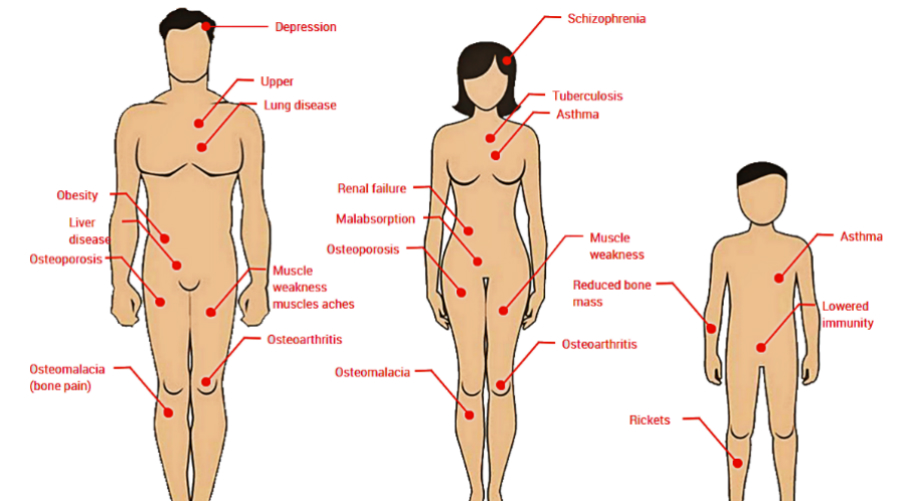Vitamin D is important for a number of reasons, including maintaining healthy bones, supporting the immune and nervous system, lung function, maintain cardiovascular health.
We mainly get the vitamin from sunlight exposure, but as well as through food and supplements. It’s absorbed by the intestines and transferred to the liver.
The liver converts the Vitamin D into a form that can be freely circulated throughout the body.
The kidneys, meanwhile, convert the Vitamin D supplied to them into calcitriol, a biologically active form of Vitamin D
The body needs a healthy supply of biologically active forms of Vitamin D. They help the body rebuild bone tissue.
However, even though this vitamin is essential for our health, there are some factors that can cause us a Vitamin D deficiency. These are everyday factors we most often overlook.
These 7 Everyday Factors Can Cause Vitamin D Deficiency:
1. Lack of sunlight.
The sun is our primary source that stimulates production of Vitamin D. Not getting enough of it is the leading cause of Vitamin D deficiency. We need sunlight for healthy skin and a good metabolism. Despite the misinformation, proper application of sunscreen does not impair the skin’s ability to manufacture Vitamin D. On the contrary, a good sunscreen can go a long way in preventing skin cancer.
2. Eating foods that cause obesity.
Fat doesn’t interfere with the body’s ability to manufacture or absorb Vitamin D. Instead, excess fat in cells sucks up too much Vitamin D. Therefore, this reduces the amount of Vitamin D available for circulation to other areas of the body. Eating foods that are high in fat and cause obesity should be avoided. Such foods include sugar sweetened sodas, fruit juices, fried potatoes, candy, white bread or other refined grains, red meat.
3. Strict vegan diet without supplementing Vitamin D.
A strict vegan diet is healthy and beneficial for many reasons. However, not including some kind of extra Vitamin D supplementation is not very smart. Since foods like eggs, fish, milk, yogurt and cheese have high amounts of Vitamin D, vegans are unable to use these benefits. But with a smarter diet and extra effort to take Vitamin D they can have a healthy diet. Vegans should eat more Maitake and Portobello mushrooms as well as Soy yogurt.
4. Sedentary lifestyle.
The sedentary lifestyle has many issues concerning human health. We are not made to have a sedentary lifestyle, our evolution path has designed us in a different way. The two byproducts of sedentary lifestyle are low exposure to sunlight and bad cardiovascular health. Both of these add up to Vitamin D deficiency, sunlight is the primary source for promoting Vitamin D production and low circulation hardens its transfer to every cell.
5. Low Calcium intake.
Both Calcium and Vitamin D are essential for strong bones. Your body must have vitamin D to absorb calcium and promote bone growth. However, a study says that low calcium intake also aggravates the consequences of vitamin D deficiency. The interactions between calcium intake and vitamin D status have been shown in rat experiments, generally indicating that a high calcium intake is good for the vitamin D economy.
6. Living in high altitude areas.
According to a study the prevalence of vitamin D deficiency among children living at high altitudes was 93% of the population. Vitamin D is important for bone development in children. A high prevalence of Vitamin D deficiency has been documented from different parts of India that’s considered a high altitude country. So an extra care for Vitamin D supplementation should be considered if you live in a high altitude area.
7. Tanning and getting a darker skin.
Melanin reduces the skin’s ability to make Vitamin D in response to sunlight exposure. This means that even if sunshine is good for Vitamin D, if you are tanning and getting darker skin, or if you have dark skin, more melanin is present on your skin to prevent the harmful effects of the sun’s rays. However, it will also prevent the sunshine to promote Vitamin D production within your body. So a balanced approach is the right approach.
References:
– https://www.ncbi.nlm.nih.gov/pubmed/22536764;
– https://www.ncbi.nlm.nih.gov/pmc/articles/PMC5240061/;






